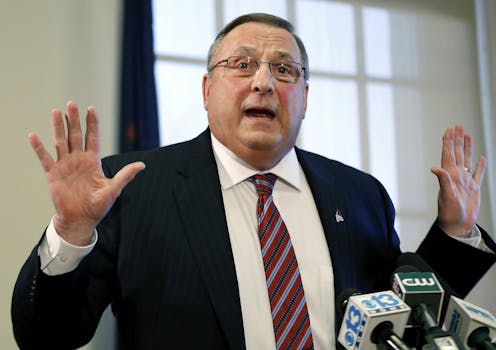Is Trump profiting from his office in violation of the Constitution? Judge allows emoluments case to
The court carefully considered what the word 'emoluments' meant at the time the Constitution was drafted.

Donald Trump has repeatedly been accused of financially profiting from being president of the United States.
Significantly, on July 25, a U.S. district judge for the District of Maryland rejected Trump’s effort to dismiss a case alleging that he accepted payments in violation of the international “emolument clause” as well as the domestic “emolument clause” of the U.S. Constitution. The foreign clause specifically says that “no Person holding any Office of Profit or Trust under … [the United States] shall, without the consent of the Congress, accept of any present, Emolument, Office, or Title, of any kind whatever, from any King, Prince, or foreign State.”
The debate in this case has centered over what the president has to do to violate these clauses. Put simply, the plaintiffs allege that foreign governments, the governor of Maine and others have deliberately frequented President Trump’s hotels and other facilities to curry favor with the president.
As a longtime U.S. constitutional law professor, who has also written about democracy and corruption in nations with newly written constitutions like South Africa, I have avidly followed the emoluments case as it brings together these two academic interests.
Corruption is a serious problem in South Africa where former President Jacob Zuma was recently indicted on multiple corruption charges.
Could Trump end up on a path at all like Zuma?
A win for the plaintiffs
That outcome became more plausible when the federal district court in Maryland rejected Trump’s position that an emoluments violation occurs only if an official profits from their government position. Instead, the court agreed with the plaintiffs, the District of Columbia and the state of Maryland, that even a private benefit, advantage or profit would be unconstitutional if the monies are connected to private facilities owned by the president or his agents.
The court examined at length what the framers of the U.S. Constitution thought about the meaning of the word “emolument.” This kind of “originalist” analysis often results in judgments that favor conservatives. However, here the federal judge found that the evidence overwhelmingly favored the plaintiffs. The judge relied mainly on scholarship from English language dictionaries and treatises, covering the period 1604 to 1806, repeatedly indicating that an emolument did not contain an official benefit or profit requirement. A private benefit or profit was enough. U.S. District Judge Peter J. Messitte even quoted John Mikhail, a professor from the Georgetown University Law Center, who found that 92 percent of relevant dictionaries define the term “emolument” as the plaintiffs suggest.
The court also pointed out how the text of the foreign emolument provision in the Constitution refers to “any kind whatever,” which favors the plaintiff’s broad interpretation.
And, the court explained that the president’s position would essentially mean that the only prohibited emoluments would be attempts at governmental bribery. The court elaborated that it is the Constitution’s impeachment provisions that are meant to deal with issues like bribery. This leaves the emolument provisions to deal with other forms of corruption.
In addition, the court highlighted plaintiffs’ allegations that after the governor of Maine stayed at the president’s hotel,
“Gov. LePage and the President appeared together at a news conference at which the President signed an executive order to review actions of the prior administration that established national monuments within the National Park Service, which could apply to a park and national monument in Maine, which President Obama had established over Governor LePage’s objections in 2016.”
The hotel where LePage stayed is the relatively new Trump hotel in the Old Post Office Building owned by the General Services Administration (GSA). The property lease prohibits elected officials, presumably like a President, from holding any share of the lease. The Court relied on the allegations about the GSA lease to support allowing the case to proceed.
The court elaborates:
“Sole or substantial ownership of a business that receives hundreds of thousands or millions of dollars a year in revenue from one of its hotel properties where foreign and domestic governments are known to stay (often with the express purpose of cultivating the President’s good graces) most definitely raises the potential for undue influence and would be well within the contemplation of the Clauses.”
The bottom line: After giving a detailed airing to the arguments in favor of the Trump position on emoluments, this federal judge found the theory of the plaintiffs to be correct based on text, views at the time of the Constitution’s framing, purpose, and pragmatic considerations about how the political world really works.
When combined with the Mueller investigation allegations into the Trump campaign’s apparent dealings with the Russians, and assertions about candidate Trump’s supposed knowledge of payoffs to mistresses, this ruling provides another arrow in the bow of those who assert that his presidency is rife with unethical conduct. The U.S. Department of Justice, however, seems likely to seek an emergency stay of the July 25 decision, to appeal the matter and to prevent the plaintiffs from seeking the discovery of documents.
It will be interesting to see if this initial decision holds up – or merely becomes a footnote to the Trump presidency. Judge Messitte’s ruling, however, is certainly a powerful document that appears to be written in a manner anticipating that a higher court will carefully review his conclusions on an appeal. And if plaintiffs ultimately prevail, it could provide fodder for impeachment proceedings.
Mark Kende is affiliated with the Iowa Democratic Party, and with the Iowa Chapter of the American Civil Liberties Union.
Read These Next
Why ICE’s body camera policies make the videos unlikely to improve accountability and transparency
For body cameras to function as transparency tools, wrongdoing would have to be consistently penalized,…
Artists and writers are often hesitant to disclose they’ve collaborated with AI – and those fears ma
Whether they’re famous composers or first-year art students, creators experience reputational costs…
Honoring Colorado’s Black History requires taking the time to tell stories that make us think twice
This year marks the 150th birthday of Colorado and is a chance to examine the state’s history.






